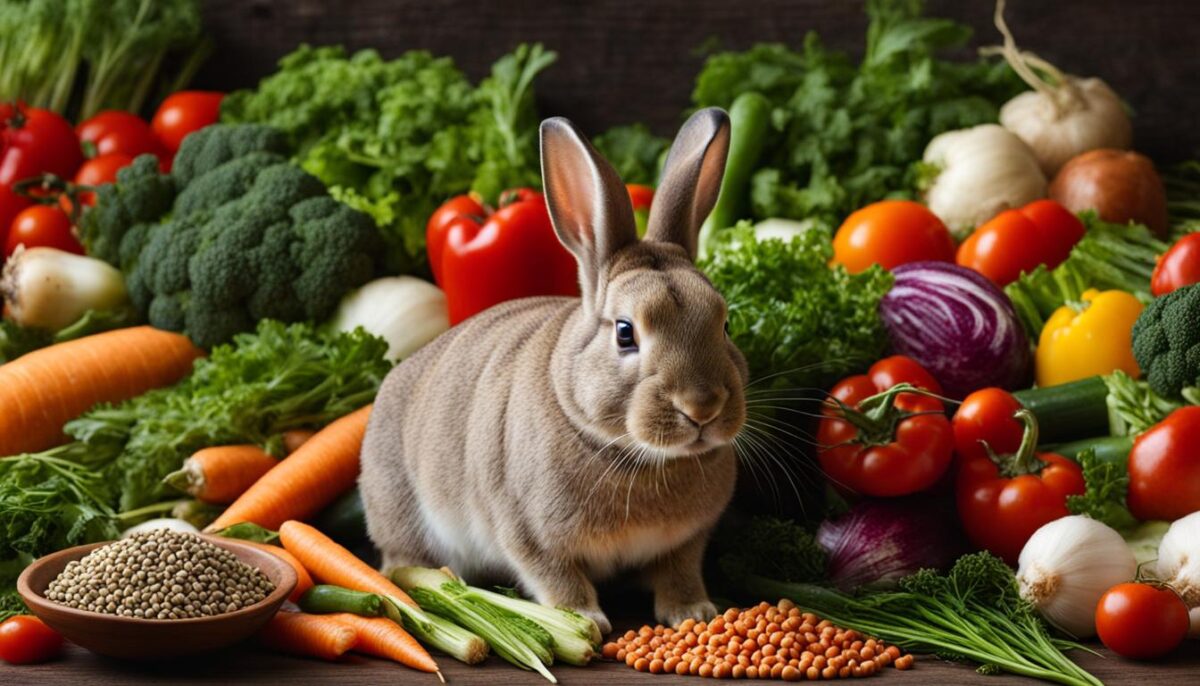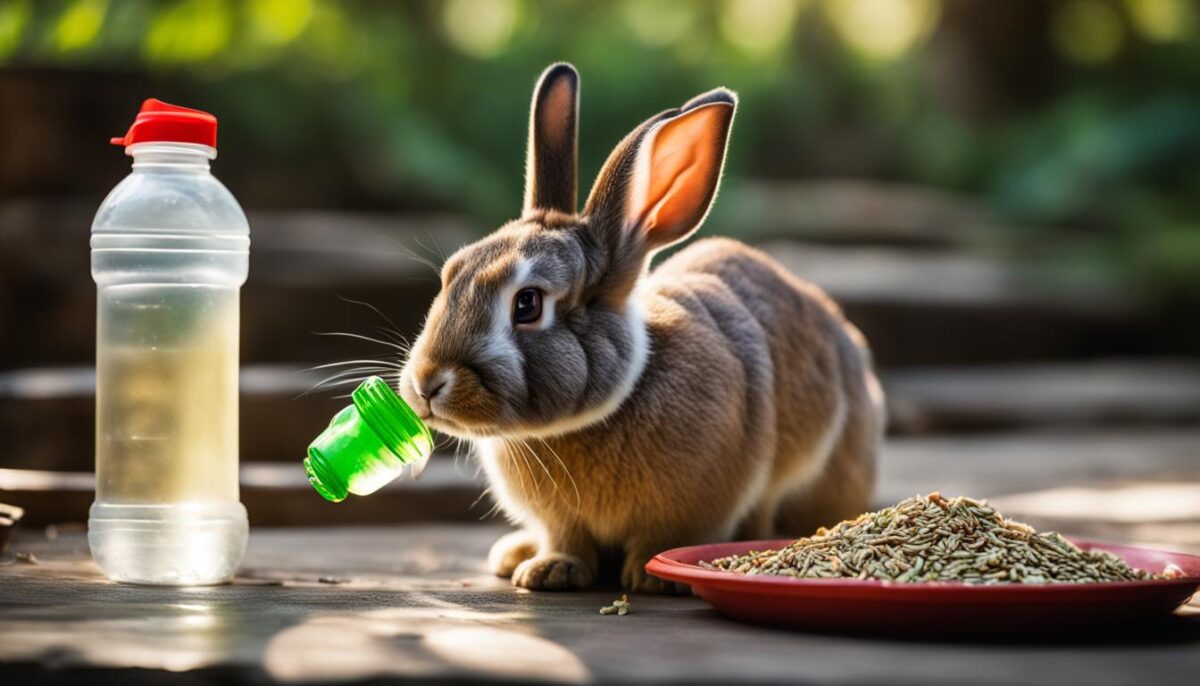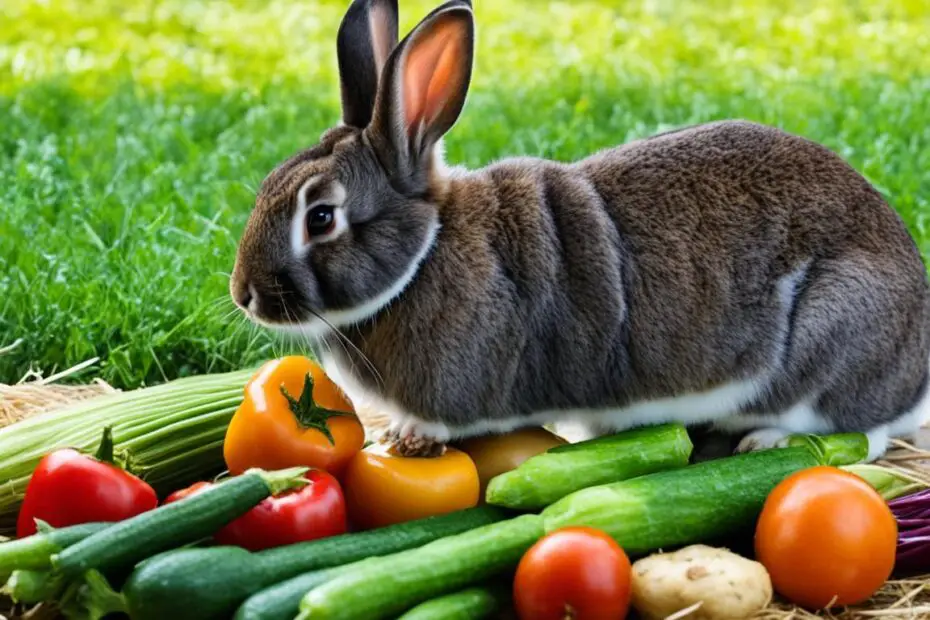When it comes to feeding our furry friends, it’s essential to understand their specific dietary needs. Rabbits, as herbivores, require a balanced diet to stay healthy and happy. While stock feed may seem like a convenient option, it’s important to know if it is suitable for our hopping companions.
Rabbit nutrition revolves around a few key components. Their daily diet should primarily consist of hay, with a small amount of fresh vegetables and pellets. Hay provides the necessary fiber for a healthy digestive tract and helps maintain proper teeth alignment through chewing. Grass hay, such as timothy or orchard hay, should make up the majority of their diet, regardless of age.
So, can rabbits eat all stock feed? The answer is no. Commercial stock feeds are often formulated for specific animals and may not provide the necessary nutrition for rabbits. It’s crucial to choose the right food options to ensure our rabbits get the nutrients they need to thrive.
Key Takeaways:
- Rabbits have specific dietary needs and require a balanced diet to stay healthy.
- Their daily diet should primarily consist of hay, with a small amount of fresh vegetables and pellets.
- Grass hay, such as timothy or orchard hay, should be the main component of a rabbit’s diet.
- Stock feed is not suitable for rabbits as it may not provide the necessary nutrition.
- Choosing the right food options is crucial for ensuring the health and well-being of rabbits.
Importance of Hay in a Rabbit’s Diet
When it comes to the diet of a rabbit, hay plays a crucial role in providing essential nutrition and maintaining overall health. In fact, hay should make up the bulk of a rabbit’s daily intake, regardless of their age. Not only does hay provide the necessary fiber for a healthy digestive tract, but it also helps rabbits maintain proper teeth alignment through regular chewing.
The Benefits of Grass Hay
Grass hay, such as timothy or orchard hay, is highly recommended for rabbits due to its nutritional value. It is packed with essential nutrients and promotes healthy digestion. Let’s take a closer look at the benefits of grass hay:
- The primary source of fiber: Hay is a rich source of fiber, which is crucial for rabbits’ digestive health. The high fiber content helps prevent digestive issues such as gastrointestinal stasis and helps keep their gastrointestinal tract moving properly.
- Maintains dental health: Rabbits have continuously growing teeth, and regular chewing on hay helps prevent dental problems. The abrasive texture of hay helps wear down their teeth, which is necessary to maintain proper teeth alignment.
- Promotes mental stimulation: Hay provides rabbits with both physical and mental stimulation. It satisfies their natural instinct to chew and keeps them occupied, preventing boredom.
Young rabbits can eat any type of grass hay, including alfalfa, which provides them with additional protein and calcium. However, it is important to note that adult rabbits should avoid alfalfa hay due to its high protein and calcium content, which can be detrimental to their health if consumed in excess.
Always Keep Hay Available
It is crucial to provide rabbits with a constant supply of hay to nibble on throughout the day. This ensures that they have access to the necessary nutrients and helps prevent boredom.
Additionally, hay should be fresh and free from molds or dust, as these can be harmful to rabbits’ respiratory systems. The hay should be stored in a cool and dry place to maintain its quality.
| Types of Grass Hay | Description |
|---|---|
| Timothy Hay | A popular choice for rabbits. It has a balance of nutrients and is suitable for rabbits of all ages. |
| Orchard Hay | Similar to timothy hay, orchard hay is another nutritious option for rabbits. |
| Brome Hay | This hay variety is high in fiber and low in protein, making it suitable for rabbits with weight management issues. |

Pellets Comparison Table
Here is a helpful comparison table of different types of pellets available for rabbits:
| Pellet Type | Ingredients | Fiber Content | Protein Content | Calcium Content |
|---|---|---|---|---|
| Timothy Pellets | Timothy hay, grains, vitamins, minerals | Minimum 18% | Minimum 12% | Maximum 1.8% |
| Alfalfa Pellets | Alfalfa hay, grains, vitamins, minerals | Maximum 30% | Minimum 15% | Maximum 3% |
| Oat Pellets | Oat hay, grains, vitamins, minerals | Minimum 20% | Minimum 12% | Maximum 0.6% |
When choosing pellets for your rabbit, consider their specific dietary needs and consult with a veterinarian if necessary. The table above can serve as a guide to help you make an informed decision based on the fiber, protein, and calcium content of different pellet types.
Vegetable Options for Rabbits
Adding vegetables to a rabbit’s diet can be a healthy way to provide variety and essential nutrients. However, it’s important to be mindful of the types and quantities of vegetables you offer. Some vegetables should be given sparingly, while others can be offered more generously to support your rabbit’s diet.
Leafy Greens
Romaine lettuce, Bok choy, mustard greens, carrot tops, cilantro, watercress, basil
A variety of leafy greens can make a great addition to your rabbit’s meals. These include romaine lettuce, Bok choy, mustard greens, carrot tops, cilantro, watercress, and basil. Leafy greens are rich in vitamins and minerals that are beneficial for your rabbit’s overall health. They also provide hydration and additional fiber to their diet.
Caution with Some Leafy Greens
Collard greens, dandelion greens
While many leafy greens are suitable for rabbits, some should be given in limited amounts. Collard greens and dandelion greens, for example, contain high levels of calcium. Excessive calcium intake can lead to urinary issues in rabbits. To avoid this, offer these greens in moderation, or consider other alternatives.
Other Acceptable Vegetables
Broccoli, green peppers, Brussels sprouts, endive, wheatgrass, radicchio, squash
In addition to leafy greens, there are other vegetables that you can include in your rabbit’s diet. Broccoli, green peppers, Brussels sprouts, endive, wheatgrass, radicchio, and squash are all suitable options. These vegetables offer a range of flavors and textures, providing your rabbit with a diverse and nutritious diet.
When introducing new vegetables to your rabbit, do so gradually to allow their digestive system to adjust. Monitor their response and watch for any signs of digestive upset. It’s also essential to wash all vegetables thoroughly before offering them to your rabbit to remove any residue or pesticides.

Chew toys made of untreated wood, such as applewood or willow, are popular choices for rabbits. These toys not only provide mental stimulation but also contribute to good dental hygiene. Rabbit-safe cardboard toys can also be a great option, as long as they are free from any adhesive or printing ink.
Remember to supervise your rabbits when introducing chew toys to ensure their safety. Regularly inspect the toys for signs of wear and replace them if they become damaged or worn out. By providing appropriate chew toys, you can support your rabbits’ dental health and promote their overall well-being.
Coprophagy and Unique Dietary Behavior of Rabbits
Rabbits have a fascinating dietary habit known as coprophagy, which involves the consumption of their own feces. While it may sound unpleasant, this behavior is actually essential for their health and nutrition.
This peculiar behavior primarily occurs at night when rabbits produce specialized feces called cecotropes. These cecotropes are different from the regular excreted pellets and play a vital role in the rabbit’s diet.
Unlike regular stool, cecotropes are rich in essential nutrients, including proteins and vitamins. When rabbits consume these cecotropes, their digestive system is able to extract valuable nutrients that were not fully digested during the initial pass through the intestines.
This unique behavior allows rabbits to maximize their nutrient intake and maintain optimal health. By reabsorbing these important nutrients, rabbits can ensure they are getting the most out of their diet and maintaining a healthy balance of essential substances.
Rabbit health and nutrition are closely linked to the practice of coprophagy, demonstrating the intricate ways in which these animals have evolved to meet their dietary needs. It is important to understand and respect this natural behavior when caring for rabbits.
Conclusion
Rabbits have specific dietary needs that contribute to their overall health and well-being. Providing a balanced and nutritious diet is crucial for their optimal development and longevity. By following the appropriate feeding guidelines, you can ensure that your rabbit receives the necessary nutrients and avoids any potential health issues.
The main components of a rabbit’s diet should include high-quality hay, controlled amounts of vegetables, and suitable pellets. Hay, such as timothy, orchard, or brome hay, should be the foundation of their diet, as it provides essential fiber for a healthy digestive system and helps maintain dental health.
When introducing vegetables to your rabbit’s diet, it is important to do so gradually and offer a variety of leafy greens. This ensures that they receive a diverse range of nutrients and helps prevent selective feeding. Pellets, on the other hand, should be given in limited amounts to avoid obesity and other digestive issues.
In addition to a well-balanced diet, fresh water should always be available to rabbits. They should also have access to chew toys, which help satisfy their natural chewing instincts and contribute to proper dental health. Finally, it is important to understand that coprophagy, the consumption of cecotropes, is a normal and essential behavior for rabbits, as it allows them to reabsorb important nutrients.
By being mindful of your rabbit’s diet and following these guidelines, you can promote their health and well-being. Always consult with a veterinarian or a qualified rabbit expert for specific dietary recommendations based on your rabbit’s individual needs. Remember that a healthy and happy rabbit starts with a proper diet!
FAQ
Can rabbits eat all types of stock feed?
No, rabbits have specific dietary needs and should not be fed all types of stock feed. Their diet should primarily consist of hay, with controlled amounts of fresh vegetables and pellets.
What should be the main component of a rabbit’s diet?
Hay should make up the majority of a rabbit’s diet. Grass hay, such as timothy or orchard hay, provides the necessary fiber for a healthy digestive tract and helps maintain proper teeth alignment through chewing.
How much pellets should I feed my rabbit?
Pellets are a supplementary food for rabbits and should be offered in controlled amounts. For adult rabbits, timothy pellets are recommended at approximately 1/8 to 1/4 cup per 5 lbs of body weight.
What vegetables are safe for rabbits to eat?
Romaine lettuce, cilantro, and other high-fiber, low-carbohydrate leafy greens are good options for rabbits. Other suitable vegetables include broccoli, green peppers, Brussels sprouts, and squash. However, certain vegetables should be fed sparingly due to their high calcium content.
Can rabbits have treats and fruits?
Treats should be given sparingly to rabbits, and fruits should be limited due to their high sugar content. High-fiber fresh fruits like apple, pear, or berries can be offered in small quantities, once or twice a week.
How should rabbits access water and satisfy their chewing needs?
Fresh water should always be available to rabbits. Some rabbits prefer water bowls, while others prefer sipper bottles. Rabbits also have a natural need to chew and should be provided with chew toys made of hard wood, timothy hay, or cardboard.
What is coprophagy in rabbits?
Coprophagy is the consumption of a rabbit’s own feces, known as cecotropes. These feces contain important nutrients, including protein and vitamins, which the rabbit reabsorbs to maintain its health. This behavior is normal and essential for a rabbit’s well-being.
How can I ensure a healthy diet for my rabbit?
By following the proper dietary guidelines, including feeding hay, controlled amounts of vegetables and pellets, limiting treat and fruit intake, providing fresh water, and offering chew toys, you can ensure the health and well-being of your rabbit.


